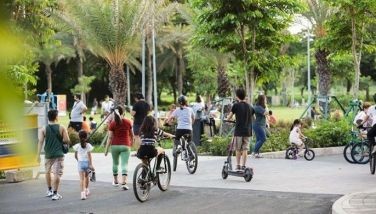Taking it slow

When people hear about Slow Food, they think it’s about slow cooking and use of recipes for a slow stew or a tinola. These recipes using native chicken that need a lot of boiling and stewing due to its inherent muscular toughness are chickens that are free range or roam freely. In a way, slow food may include such native fowl as these are now endangered and need to be exposed to be saved from extinction. Yes, these native breeds are being replaced by foreign species that can lay eggs on command, grow to full size in 21 days instead of 55-60 days. And that’s a scary thought – losing our native species of fowl and other animals.
Due to increased imports of food like chicken, pork and beef, our local farmers are no longer interested in saving native varieties like our native chicken, local yellow cattle and wild black pigs. This is what we advocate in the Slow Food movement (www.slowfood.com). We need to preserve food cultures, traditions and ingredients that are originally ours and not introduced varieties.
Have you seen local cattle? They are slim, small but resilient against extreme weather conditions. How about black pigs or the local variety and not the Japanese kurobuta? They eat mostly vegetables, roam around the farm and are not the white mestizo kind we often see in crowded piggeries or small pigpens. We need to save these species if we are to preserve our food culture.
At our recent Slow Food Congress held in Pollenzo, Italy, about 50 councilors representing about 160 countries, indigenous peoples and the youth discussed how to communicate these worrisome conditions of food around the world. We are losing original heirloom species to hybrids that yield more and whose intellectual property are now mostly owned by private companies, not by farmers or indigenous groups. If we must really address climate change and food insecurity we must go back to basics: Biodiversity, Education and Advocacy.
Biodiversity. Let’s go back to how Nature intended it to be. We had many kinds of plants and animals that co-existed and allowed the planet to be a cool and productive one. We had many fish species, a lot of diverse kinds of flora and fauna. That is a biodiverse world that evolves but preserves original species. And we were OK until man started to be greedy, started to mess with natural food and started to think of yields and scale. That is how the problem started: modified plant species to yield more to feed our growing global population. Everyone harped on food security as a reason to make hybrids, “better” seeds and simply tampered with Nature for personal gain. Look what happened. This is probably the most food insecure time we presently are in.
Education. We must teach our children where food comes from. We should use different media to reach the young as they are our hope to return food systems to what were natural and pristine. We must preserve food traditions innate to cultures – how to use bamboo pith, banana trunks and coconut for many recipes to feed our people. We can look around and stop importing processed and adulterated food.
Children must know how to tend gardens for real food security as we did in the past. Let us bring back school gardens and backyard plots to know where our food comes from. This must be our Department of Education (DepEd)’s role : teach food security to get our demographic sweet spot working on the future of food. Our population is young, a condition which we can leverage on—teach the young how to grow food and not be dependent on imported food.
And finally, Advocacy. We must be relentless in our desire to help our elected officials lead in preserving biodiversity, in promoting laws for food security and including education of the young about good, clean and fair food production. We can start with the smallest unit of the government, which is our own barangay or village. And also start in the smallest social unit which is the family.
I see comments on Facebook about those who still believe that inorganic fertilizers are important. Until the government changes its policies on agriculture, it will always be an uphill battle for organic practitioners. The agriculture department is aware about organic food production and this pandemic is helping us fast track conversion to more eco-friendly ways. How? With fuel prices ever-increasing, petroleum-based fertilizers will be more expensive, too. This may force our farmers to make their own inputs and not be dependent on imported chemicals and fertilizers.
So ultimately, this pandemic is actually helping us go back to how Nature intended it to be. The Universe used this pandemic to make us go back to old ways of farming, old ways of securing our food supply and avoiding our exposure to harmful chemicals and pesticides. With the peso devaluation it will become more expensive to use imported inputs, too.
The pandemic disrupted supply chains and prevented long chains that used more fuel and caused fruits to be picked when still unripe due to the long distance it has to travel. So now we are forced to look for suppliers closer to our point of use. We are learning to buy local and support our local farmers and producers. We may soon be eating better fruits picked when ripe or in season. Vegetables that will survive will be the local sturdy ones vs vegetables that are geared for temperate climes. We can go back to eating healthier kangkong, talbos ng kamote and malunggay – and this is food security.
The world is in a state of flux with economics in a topsy turvy mode. The best way to meet these challenges is to take it slow. Go back to Slow Food. Go back to local food. And let Nature take its course, slowly but surely.
- Latest
- Trending






















